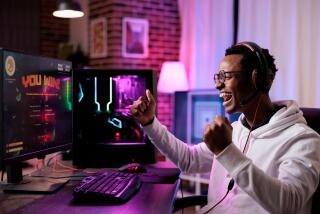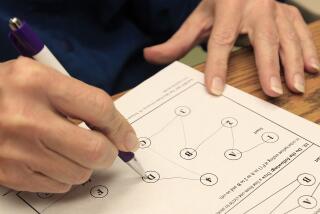Brain games rack up mixed scores
Brain games can definitely fire up your neurons and help you learn new skills -- at least as they relate to the games themselves. But psychologists and neurologists still have one big question: Does mastering any of these brain training games really improve a person’s thinking in real life? Can getting better at playing rock-paper-scissors, tracking birds on a screen or fielding rapid-fire math questions really help a person manage schedules, remember names and keep up with work? And can such mental gymnastics slow, or reverse, cognitive decline?
Many studies have found that staying mentally active throughout one’s life -- via education, intellectually challenging work, a rich social life and demanding hobbies such as playing a musical instrument -- can improve overall memory skills and create a buffer zone that protects the brain from age-related losses. But very few studies have looked at the effect of brain-training games, and none of those tracked real-life results, says Liz Zelinski, a professor of gerontology and psychology at USC.
“We don’t know if you improve anything beyond the activities that you practice,” she says.
Still, there’s new reason to think that at least one brain-training regimen might offer lasting and far-reaching benefits. Zelinski and a team of other researchers recently tested the Brain Fitness computer program on a group of nearly 500 mentally sharp seniors 65 and older. The study was partially funded by Posit Science, which sells Brain Fitness, but Zelinski says she has no financial ties to the company or the product. Half of the group used the program one hour a day, five days a week, for eight weeks. The other half spent an equal amount of time watching educational DVDs and answering quizzes about the shows.
As published in the Journal of the American Geriatrics Society in April, follow-up tests showed that the Brain Fitness group had better attention and memory than the DVD group, even on tasks that were completely different from their training. (Memorizing a list of written words, for example.) Although the researchers didn’t specifically look for real-world improvements, the subjects using the Brain Fitness program did say that memory, focus and overall thinking skills improved after eight weeks of training.
“That was encouraging,” says Glenn Smith, lead author of the study and a professor of psychology at the Mayo Clinic College of Medicine in Rochester, Minn. And the results caught him by surprise.
“I went into this research as a big skeptic,” Smith says. “But what [Posit Science] is trying to do makes sense.”
In retrospect, the close attention and careful listening required by the program seem well-designed to encourage new connections in the brain, he says.
A few decades ago, scientists assumed that there was no way to slow or reverse signs of aging in the brain. “The view used to be that brain cells die and can’t be replaced.” Smith says. “Now there’s a more hopeful notion that the brain is malleable and plastic.”
Studies of aging rodents suggest that challenging tasks can spur the growth of new brain cells and new synapses, the connections between cells that support learning and memory.
In all likelihood, humans can achieve similar growth if they’re sufficiently challenged, Zelinski says. (Researchers have to physically dig around in the brain to track such things, so nobody’s done before-and-after studies of humans.)
But you’re not likely to build new connections in your brain doing the same things you’ve always done before, Zelinski says. The brain’s need for novelty is one reason she started taking piano lessons two years ago. “It’s challenging, but I’m having a blast,” she says.
Although there have been no published clinical trials about Lumosity, Zelinski believes the subscription-based website’s offerings may have brain-building potential too. In general, she says, games that get progressively harder to match a user’s improving skill -- as Lumosity games are designed to do -- can help expand the brain. A company-sponsored study of 23 people (average age 54) reportedly found that training 20 minutes a day for five weeks improved memory and visual attention. The study was presented at a Society for Neuroscience meeting in 2006 but hasn’t been published in a peer-reviewed journal.
The Nintendo DS games Brain Age and Brain Age 2 likely aren’t challenging enough to be a serious brain-building tool, Zelinski says. “With Brain Age, you’re probably not making any new connections,” she says. “You’re just practicing old ones.” In this way, she says, the game is like crossword puzzles or sudoku.
Exercising old synapses can be worthwhile, Zelinski says. The math games in Brain Age 2, for instance, may help you figure out a grocery bill or balance your checkbook without a calculator. “If you value being able to do mental arithmetic, that’s beneficial,” she says. “It’s a fun, pleasant diversion that might have some benefits.”
Although all of the subjects in the Brain Fitness study were in their 60s and older, Zelinski says that hard-core brain training potentially can help people of just about any age. “Things that happen to the brain early in life are a strong predictor of what happens later in life,” she says. For example, she says, Alzheimer’s patients who had a good education in their early years can often lose a surprising amount of brain function before they start showing any symptoms of the disease.
There’s no evidence that any brain training game can help prevent Alzheimer’s disease entirely, Smith says. But a study published this month in the journal Neurology found that staying mentally active by doing puzzles and games can help delay memory loss in people who eventually develop dementia.
If you’re worried about your own thinking skills for now and in the future, a good pair of walking shoes might be a better investment than a brain game. “There’s a lot of evidence that physical exercise is just as important as mental exercise for brain health,” Smith says.
Art Kramer, a professor of psychology at the University of Illinois at Urbana-Champaign who specializes in brain changes and aging, says he personally doesn’t use any brain training games, but makes sure to exercise five times a week.
“I get enough mental stimulation in my job,” he says.
From Kramer’s perspective, brain training games still haven’t proven their value for the general public, either. “They may be fun, and that’s good,” he says. “But a lot of people have higher expectations.”
::
Unsure if my own job was helping my brain or slowly destroying it, I tested myself on the Brain Age 2. (I didn’t want to start any online subscriptions and I wasn’t quite ready to invest $400 for a smarter future. Luckily, a neighbor kid had a Nintendo DS that he let me borrow.)
Optimistically thinking my brain was roughly as old as the rest of my body -- hey, maybe even a bit younger -- I plunged into the first task, a verbal game of rock-paper-scissors.
I stumbled for words a few times and didn’t always pull out the right weapon. The verdict: I was told that my brain was 51, exactly 10 years older than the rest of me.
It could have been worse. On his first try, my 16-year-old son was told he had the brain of an 80-year-old. (This partially explains his forgetfulness when it comes to the garbage.)
Zelinski says her first Brain Age score was 68. “I was horrified,” she says. After four sessions, she got it down to 20.
I’ll work on lowering my score, too. It may not make me any smarter, but I’ll feel better when my brain and I are back in the same decade.
--
health@latimes.com






